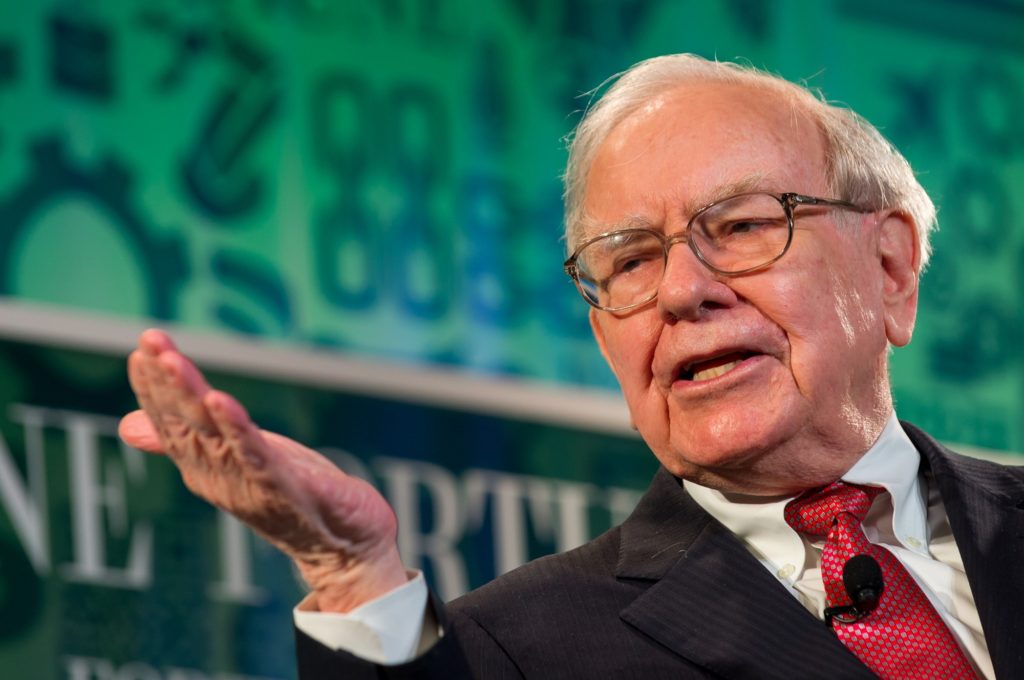
Warren Buffett is arguably the best investor in the world, and his penchant for picking winning stocks for long-haul portfolios makes it worth knowing what stocks he’s buying for Berkshire Hathaway’s (NYSE:BRK-A) (NYSE:BRK-B) portfolio.
Fortunately, big investors like Buffett file a 13F report with the Securities and Exchange Commission each quarter that shows what they’ve been up to. In the case of Berkshire Hathaway, the latest report shows he’s been busy buying Apple Inc. (NASDAQ:AAPL), The Bank of New York Mellon Corporation (NYSE:BK), and Teva Pharmaceutical Industries (NYSE:TEVA). Are these stocks right for your portfolio, too?
Going all in on Apple
In 2012, Warren Buffett said that a few years earlier, he had recommended to Steve Jobs that he use Apple’s growing cash stockpile to buy back Apple’s stock. Buffett didn’t take his own advice until 2016, but Apple’s become Berkshire Hathaway’s biggest holding since then.
Apple’s shares have rallied significantly since Buffett first added them to Berkshire Hathaway’s portfolio, yet his appetite to acquire more shares hasn’t abated. Even as Apple’s shares rallied higher over the past year, he added 31.2 million more shares to his position in the fourth quarter of 2017, bringing his total holdings to more than 165.3 million shares, worth at least a staggering $28 billion as of this writing.
The decision to make Apple his biggest position suggests Buffett isn’t very worried about short-term concerns over iPhone X unit volume. Instead, he appears solidly convinced that consumers will continue to upgrade their aging phones to Apple’s latest devices — and that their doing so will increase margin-friendly revenue across Apple’s ecosystem.
If he’s right (and I think he is), then there’s reason to join him and buy Apple shares, too. Apple’s long-term plan is to double services revenue between 2016 and 2020, and last quarter, record smartphone sales kept it on track to achieve its goal. Despite having one less week in that last quarter, the company’s total revenue was $88.3 billion, up 13% year over year, and its services revenue was $8.5 billion, up 18% from one year ago.
Sales growth boosted quarterly earnings per share by 16% year over year to $3.89; cash flow from operations of $28.3 billion was more than enough to cover the $14.5 billion Apple returned to investors via dividends and stock buybacks.
There are now more than 1.3 billion active Apple devices, up 30% from two years ago. The company is launching new products like HomePod. And its financial position is set to dramatically improve in the wake of tax reform. Given all these facts, picking up Apple’s shares while they’re trading at less than 13 times forward earnings makes sense.
Branching out in banking
It’s not news that Wells Fargo has long been a big Buffett holding, but that hasn’t kept Buffett from adding other banks to Berkshire Hathaway’s portfolio.
Lately, his favorite to buy is The Bank of New York Mellon. This is a financial services company with a $59 billion market cap that makes money helping high-net-worth individuals manage their money. It offers investment management, trust and custody, fund administration, securities lending, global payments and cash management, banking, and clearing services to its clients. It also has a corporate banking business.
The stock market’s rally has been very good news for The Bank of New York Mellon’s fee revenue, as it leads to greater assets under management. Baby boomers’ demand for legacy planning strategies provides tailwinds to its trust business. Thanks to global economic growth, corporate services demand is also increasing.
Those tailwinds are reflected in the bank’s trailing-12-month return on equity, which has steadily increased over the past three years and is now 11.2%. In 2017, the bank earned $3.9 billion ($3.72 per share), up 18% from 2016; total revenue was $15.5 billion, up 2% from 2016.
With profits booming, it’s easy to understand why Buffett increased his stake in the bank by 10.6 million shares. At 60.8 million shares, The Bank of New York Mellon is now Berkshire Hathaway’s 10th-largest position, and it wouldn’t surprise me if it becomes an even bigger position in the coming year.
Jumping into generics
The most surprising addition to Berkshire Hathaway’s portfolio last quarter was Teva Pharmaceutical. Teva Pharmaceutical has been plagued by stiff generic-drug competition that’s crimping pricing power. It’s also been weighed down by the mountainous debt it incurred when it acquired Allergan’s generic-drug business in 2016 for $33.43 billion in cash and about 100 million shares.
Additionally, Teva Pharmaceutical’s competitor Mylan Labs won approval from the Food and Drug Administration last fall for a generic version of Teva Pharmaceutical’s top-selling drug, Copaxone, and that generic is significantly cutting into Teva’s sales. In the fourth quarter, declining sales of Copaxone caused Teva Pharmaceutical’s revenue to tumble 16% and its non-GAAP EPS to slide 32.6% from Q4 of 2016.
Teva Pharmaceutical’s challenges have caused its shares to fall dramatically from over $60 two years ago to about $20 today. Buffett’s buying suggests that the drop is creating an opportunity to buy this stock on sale.
If Teva Pharmaceutical can execute on a major restructuring of its business, then he might be right. New management has a plan that could create $3 billion in savings by the end of 2019, half of which is expected to be realized this year.
Yet Teva Pharmaceutical’s rebound is far from a certainty, and that makes it a risky stock for average investors to buy now. Management expects competitors to continue chipping away at Copaxone’s more than $3 billion in sales this year. As a result, it only expects revenue of between $18.3 billion and $18.8 billion in 2018, down 17.2% from 2017 at the midpoint; it also expects its EPS will slump to between $2.25 and $2.50 — a big decline from the $4.01 it delivered in 2017.
Overall, Teva Pharmaceutical has a lot of work ahead to return to its winning ways. Investors might be better off looking elsewhere.